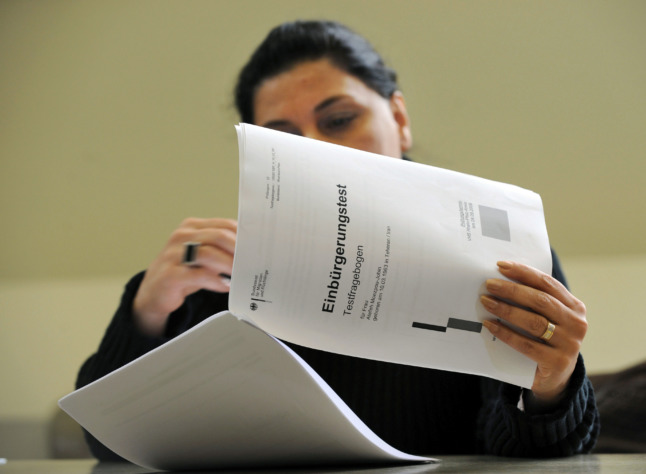Germany’s new coalition government is currently working on a reform to citizenship law which, amongst other things, will allow dual citizenship and significantly cut the required residency times for those wanting to become German.
READ ALSO: TIMELINE: What happens next with Germany's plans to allow dual citizenship?
With the law expected to be passed in the summer of this year, many budding German citizenship applicants may already be putting together their paperwork to apply for naturalisation. However, even when the law passes, many could still be in for a long wait before they can get their hands on a German passport.
That’s because, according to a new study by MEDIENDIENST INTEGRATION (Media Service Integration), there are currently at least 115,000 pending citizenship applications throughout Germany.
Having contacted the naturalisation office of the 23 most populous cities in Germany, the organisation found that waiting times range from 6 months to 3 years.
Several cities, including Augsburg, Braunschweig, Essen, Hamburg, Munich and Münster, reported that their average processing time for citizenship applications is currently around one year.
Others, such as Aachen, Bremen, Karlsruhe and Stuttgart, estimate the average processing time at around 1.5 years.
Chemnitz, however, reported that waiting times for German citizenship are between six months and 3 years.

Out of all of the cities MEDIENDIENST spoke to, Berlin currently has the most open applications with around 26,000 currently being processed.
As The Local reported earlier this year, for many, citizenship applications in the capital are currently on hold or are likely to be significantly delayed in 2023, as the city undergoes a restructuring of its naturalisation processes: the local naturalisation offices are to be combined into one central office starting in 2024.
READ ALSO: ‘Unconstitutional’: Berlin politicians condemn delay to citizenship applications
Applications on the rise
One of the main reasons behind the long waiting times for applications is the fact that, in many cities throughout Germany, the number of people applying for German citizenship is on the rise.
In Braunschweig, Bremen, Dresden and Düsseldorf, the number of naturalisations in 2022 increased by around 30 percent compared with the previous year. In the North Rhine-Westphalian cities of Münster and Wuppertal, they increased by 40 and 56 percent respectively. In nearby Gelsenkirchen, there were twice as many applicants for German citizenship in 2022 than in 2021.
In almost all of the cities included in the study, most new German citizens originally come from Syria. In Bremen, about half of those who naturalised in 2022 were Syrians. Many new German citizens also came from Iraq, Turkey and Iran. Among the EU citizens who acquired German citizenship, many came from Poland and Romania.
What are cities doing to combat delays?
MEDIENDIENST reported that all of the cities they contacted have taken some measures to try to speed up naturalisation - or are planning to do so in the near future. The vast majority of cities are focusing on digitisation, more staff and better information services.
READ ALSO: Germany's citizenship reform aims to meet needs of immigrants, draft law reveals
In Bielefeld and Munich, citizenship applicants can already apply digitally, while cities such as Bonn, Braunschweig, Essen and Gelsenkirchen are planning a switch to digital applications. In Wuppertal, naturalisation applications can be submitted by e-mail.
In Leipzig, a separate naturalisation department was established in early 2023 to enable improve the application process. The plans for a centralised naturalisation office in Berlin - with an extra 120 new staff members - are also intended to speed up procedures from 2024.
Thanks to increased staffing and digitisation, Düsseldorf, for example, has doubled its naturalisation figures within the last few years: in 2022, around 3,000 people were naturalised in the city. Before the pandemic began, there were an average of 1,500 naturalizations per year.
Some cities also offer extensive information and support services to help people prepare for the citizenship application process. For several years, so-called 'naturalisation guides' in Hamburg, Bremen and Hanover have been accompanying and advising foreign citizens who want to naturalise.
Münster and Wuppertal also organise information events on naturalisation and provide additional information on their websites.

Comments